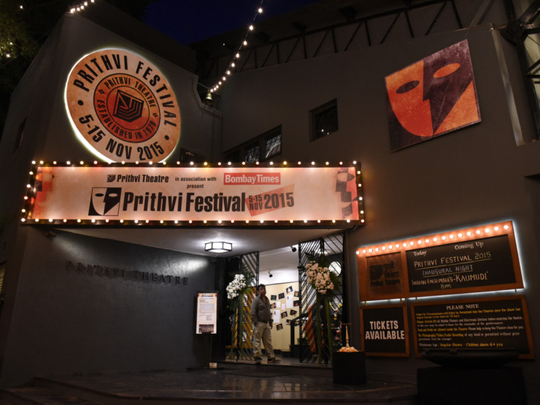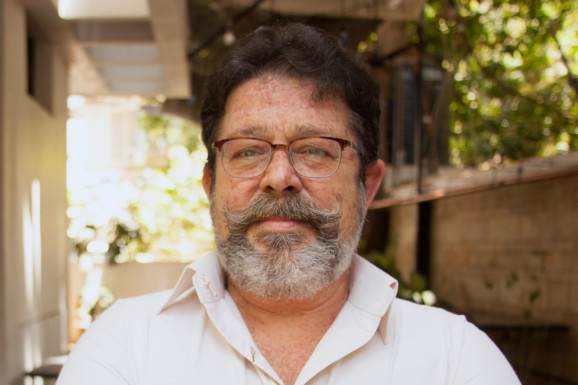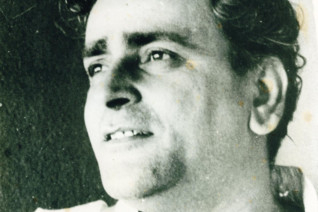
The Prithvi Theatre named after legendary Bollywood filmmaker Prithviraj Kapoor, was started by him as a repertory company in 1944. Then known as Prithvi Theatres, the company staged 2,662 shows of plays in Hindustani in 112 towns of India.
“I was four months old when my mother, Shaukat Kaifi, would strap me to her back and take me to Opera House in Bombay, which was the headquarters of Prithvi Theatres. I used to also accompany her on tours with Prithvi Theatres,” veteran Bollywood actress Shabana Azmi told tabloid!. “Prithviraj-ji was very sensitive to the needs of young working mothers long before the idea of creches was built into the system”.
But after 16 years, Kapoor who was just as famous for his booming voice as his acting skills lost his voice due to cancer and could no longer keep the company going, as he financed it with the money he made from acting in films, his grandson and current trustee of Prithvi Theatre, Kunal Kapoor tells me.
“[Prithvi Theatres] was Prithviraj Kapoor’s dream. His company with over 100 people performed specifically written plays in the early post independent era and early 1960s,” Kunal said. “And he dreamt of having a home for this theatre company in Bombay [now Mumbai]. So he leased two pieces of land facing Juhu [Beach]. In the mid 1960s, he built a theatre on one of them and a cottage for himself and visiting artists on the other”.
But the theatre he built was barely a working building and was never used, Kapoor said. Interestingly, he had leased the land for only 10 years, which expired in 1972, the year he died.
“[When] many years later Prithvirajji moved residence to Janki Kutir and became our immediate neighbour, he purchased a plot of land right opposite my parents’ cottage,” said Azmi, who is bringing her production Kaifi Aur Main as part of Prithvi@Dubai, the first Prithvi Theatre festival to be held outside India. “When Shashi Kapoor decided to fulfil his father’s dream he placed his wife Jennifer in charge. There was a lot of resistance from the residents because Janki Kutir was a residential complex. My parents Shaukat and Kaifi Azmi literally went from door-to-door to plead the case and brought the residents around. This, despite the fact that they were the ones who stood to lose the most because the proposed theatre would block their sunlight and air — such was their admiration for Prithviraj Kapoor.
“I was present when the first brick was laid and my first professional theatre performance in Sufaid Kundali — an adaptation of Bertolt Brecht’s The Caucasian Chalk Circle directed by M.S. Sathyu and produced by IPTA in 1980 — was held there,” Azmi said.
Fulfilling dreams
Veteran Bollywood actor Shashi Kapoor was the most theatre-inclined of Kapoor’s three sons and the reason he decided to build the theatre was that in the early 1970s he was making films that were “less overtly commercial”, Kunalsaid.
“It was only dad — Shashi Kapoor — from the family who decided to fulfil his father’s dream. He bought the land and formed a trust. He then rebuilt the theatre,” Kunal said. “Dad was making films like Junoon, 36 [Chowringhee Lane] and Vijeta. And he wanted to simultaneously introduce his style of films and work in theatre. Hindi theatre, particularly in Bombay, had virtually disappeared due to lack of affordable, workable spaces. So he decided to create Prithvi Theatre as a cheap, well equipped, not-for-profit centre to promote professional theatre and a discerning, educated audience for performing arts”.
The 200-seat Prithvi Theatre then opened its doors in 1978 under the able guidance of Shashi’s wife, Jennifer Kendal, an excellent theatre and film actress. The first play to be staged there was Udhwastha Dharamshala, a Marathi play staged by Bollywood legends Om Puri and Naseeruddin Shah.
“Om Puri had formed his own group called Majma, which had performed the inaugural show at the Prithvi Theatre. Om had played the main part and I was playing a ‘walk-on’ because some actor had deserted him at the last minute,” Shah said, recalling his performance at the opening of the Prithvi Theatre. “As long as that play stayed alive I did many different walk-ons in that play. It was a joyous occasion! Lots of people you’d never expected to see, lots of familiar faces, celebrity faces — just about everybody was there in Prithvi Theatre. It was a tremendous launching”.
But it wasn’t the first time that Shah was on stage at Prithvi Theatre.
“I had been rehearsing a play called Zoo Story before doing Udhwastha Dharamshala, and presented it much later. The roof was being done, the stage wasn’t nearly built. There were no seats, just these cement tiers. I did many rehearsals of the Zoo Story there in the half built Prithvi Theatre, one with about 10-15 people watching me,” said Shah.
Five years later, Kunal said, with shows every day from Tuesday to Sunday, she organised the first Prithvi Theatre Festival. The festival was to be an annual event but the unfortunate death of Kendal put a question mark on it.
“When my mother died in 1984, I took over as a trustee. At that point we had what one can call the ‘wolves howling’ phase. Jennifer wasn’t there anymore so people thought the theatre would shut down,” Kunal said. “But I was adamant that nothing of the sort would happen — my family didn’t build this to be a five-year flash. With Feroz Abbas Khan’s help we presented a month long festival in February 1985 to coincide with my mother’s birth anniversary. Feroz had been involved with Prithvi Theatre right from the beginning and had been quite close to my mother. Then we did another festival again the same year in November. Now, 38 years later, we’ve had 20-odd festivals — yes there were times when we may have skipped a year somewhere — and will have our first festival internationally”.
Uncertain times
Shah confesses that he was one of the sceptics who didn’t think the not-for-profit theatre space would last.
“Prithvi has been a sort of a watering hole for young theatre persons who’ve wanted to do something and it did not involve huge expenditure. That was the purpose for which it was founded and it has really stuck to its guns, I have to say,” said Shah. “It has provided a space to hundreds of young theatre people to be able to present their work. Before Prithvi there was this theatre called the Chhabildas Theatre in Bombay which was a haven for experimental theatre in Marathi and Hindi. There was no place for holding English language theatre. Prithvi provided that.
“Initially, Prithvi did not charge for space rental. Instead the groups would pay according to the people who came to watch the performance, which was highly magnanimous of the Prithvi management, especially for newcomers. And it continued for many years, until it became, let us say, ‘fashionable’ for people to go to Prithvi Theatre. I was myself somewhat pessimistic as to how they would sustain with the kind of excellence that Jennifer always demanded. But they’ve done it together as a family and I must say if it wasn’t for Prithvi Theatre there would be a number of youngsters, perhaps myself included, who would not have found a way to begin presenting their work,” said Shah.
An exclusive spot
The theatre still has no funding by any governmental or private or corporate body, though there have been occasional donations. Through ticket sales, it just about makes ends meet. The land and buildings were completely financed by Shashi. Yet, last year Prithvi Theatre had 643 shows with an average audience of 80 per cent every day.
“We cannot afford to accommodate all the groups that want to perform here. In fact, Mumbai can easily absorb another 50 Prithvi Theatres without batting an eyelid. Prithvi is exclusive in the sense that you will never have a fashion show or a concert or a religious discourse or a shareholders board meeting there. All the other theatres — I refuse to call them theatres, they are auditoriums — they are available for any form of events. Personally I find this upsetting because that place was designed and meant for a performance only. This single-mindedness is what made Prithvi. These unbendable values and principles that this stage is meant for performance. We’ve never had a dark night. It’s almost like a religious fanaticism. In the last 38 years, despite the fact that there has been a major death happened in India, the country has shut down to mourn, Prithvi hasn’t closed. We may not have had a ticketed public show but the lights came on and we’ve had a rehearsal or a practice session — something took place there. It didn’t shut even when my mother died or my grandparents died — it stuck to the saying ‘the show must go on’,” Kunal said.
WHAT THE STARS SAY
“Prithvi is like our second home. First time I performed there was in 1991 with Chingaari [a theatre group from Delhi, Kapoor was part of] did four plays in the festival that year. It is one of the best theatre spaces in the country. In 1993, I directed a play for Prithvi — Who’s Afraid of Virginia Wolfe? — in which Sanjana [Kapoor, Shashi Kapoor’s daughter] also acted and produced it. I don’t think Prithvi has produced any more plays after that. My plays Hamlet, C For Clown, Nothing Like Lear have all opened at Prithvi”. — Rajat Kapoor
“I’ve been performing at the Prithvi Theatre since 1979. In fact I was away at the National School of Drama when Prithvi opened and each time I came back for a holiday that was the go to place. I still remember walking around it when it was being constructed and Jennifer showing us around the entire stage. I remember distinctly feeling that this was probably the most thoughtfully appointed, intelligent theatre I’ve seen in our country. Most of the theatres are so stupidly designed, especially the technical aspect of it that it is amazing that any plays get done there. There were many of us who were learning on the job and trying to figure out what kind of theatre we wanted to do. If Prithvi had not existed — as did Chhabildas [Theatre] before that — we could not have afforded to do plays in a larger space. The kind of plays we preferred to do taxed the audience a little a bit. We were experimental — with the language, with complex ideas — and it is very hard to do plays like this in a large auditorium because not so many people are interested in coming to see such plays regularly. So if there were no Prithvi, or no Chhabildas or no NCPA Experimental Theatre, none of us could have tried out the things we did”. — Ratna Pathak Shah.
“According to me, Prithvi Theatre is iconic in the entire country. Also somewhere Prithvi has been instrumental in bringing artists of different vision, kind and theatre, under their umbrella. I came to Mumbai some 20 odd years ago and Prithvi was the first place I went to as I had trained in theatre and wanted to do theatre. Rajat Kapur took me because one of his plays was being staged there. And I realised that it was an authentic black box theatre which nobody makes anymore. What I had learnt was that a black box theatre was an ideal theatre space to not just do plays because it kind of keeps it neutral, but also to create new work — and Prithvi had been doing that for a decade. But in the last 20 years I’ve seen Prithvi bring in artists, playwrights, plays, theatre groups and repertories from all over the world. Even if you do not understand the vision that Prithvi has or the endeavour it makes, somehow it still impacts you as an artist. We all have an inherent warmth for Prithvi. It gives you that warmth, that homely flavour that if you want to create something but don’t have much to work with, they are always there to encourage you”. — Vinay Pathak.














